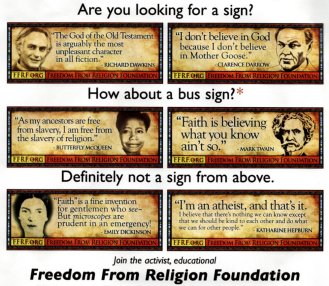Both Greta and Hemant have commented on the full-page ad run by the Freedom from Religion Foundation in the latest issue of UU World, the magazine of the Unitarian Universalist Association. Since I have a copy of that issue, I thought I’d say some things about it as well.
No one, of course, is denying that UU World would have been completely within its rights to reject the FFRF ad if they had chosen to. But that isn’t what they did. Instead, they accepted and ran the ad, which means that editorial staff at a fairly high level must not have seen any problem with it initially. Only after the magazine was published, and after some readers complained, did they apologize and state that it shouldn’t have been run.
I think it’s obvious why UU World‘s staff didn’t see a problem with the ad: a significant percentage of UU members are atheists. By many definitions, I’d be one of them – I occasionally attend a UU church with my fiancee, and I’m not the only atheist in the congregation by any means. In fact, I’m fairly certain that atheists are a plurality there. This seems like a perfectly logical place for the FFRF to advertise, because the ad does speak to a large and important part of UU membership.
Granted, the FFRF ad contains some quotes criticizing religion in general – particularly the one from Butterfly McQueen, which equates religion with slavery. Since Unitarian Universalism describes itself as a religion, I can understand why some UU members were offended.
However, I don’t think the fault lies with the FFRF. If anything, I think Unitarian Universalism is to blame for all the fuss. Long ago, they made a choice that’s led to much confusion: they brought in traditional religious terminology to describe themselves, but the way in which they use those terms in practice is very different from how they’ve historically been defined.
The fact that they call themselves a “religion” is example #1. UU has no sacred text, no statements of dogma, and no formal creed. It doesn’t even require a belief in God, and it proclaims that atheists and agnostics are welcome in its congregations. The only thing that connects UU members is a set of seven principles for moral behavior, which you can justify to yourself in any way you like.
Needless to say, this is not how the vast majority of people would understand the term “religion”. The historical meaning of that word has always included some supernatural component and some set of shared beliefs, and UU has neither. But nevertheless, it’s chosen to call itself a religion. Doubtless, this was a marketing decision: it expresses the point of this activity in a way that outsiders can easily understand, makes it seem more familiar and appealing, and not coincidentally, allows UU to make a play for its share of the automatic respect and deference that always seems to accrue to anything calling itself a religion.
But a consequence of this is that UU members will naturally perceive themselves to be among the targets of any attack on “religion”, even if the people who uttered those statements were clearly thinking of a completely different kind of belief system. As I said, it was this unfortunate choice of wording that’s led to so much confusion. I strongly doubt that the Freedom from Religion Foundation has any complaint against Unitarian Universalism – in fact, there’s undoubtedly a substantial overlap in their membership! – and as long as they continue to welcome atheists and support the separation of church and state, Unitarian Universalism has no reason to fear any goal the FFRF might seek to accomplish.
This is a situation where Unitarian Universalism has put itself in the line of fire, so to speak, when it didn’t need to. UU isn’t truly a religion in the sense of the word that the FFRF and other atheists criticize; it’s more like a secular humanist philosophy, one that just happens to dress in trappings of religious language. What this story really shows is yet another example of the negative effects that follow from society automatically assuming any religion to be worthy of respect and deference.
